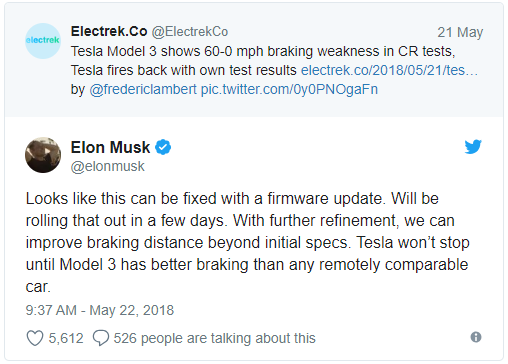After a rough week under the media spotlight, Tesla is moving in quickly to address some of the Model 3 issues highlighted by car review magazine ConsumerReports.
So, don’t be fooled by Elon Musk’s mini meltdown against paid media on twitter, he is silently working on the back-end to win over his critics. At least the ones who he thinks are worth his time.
A few days ago, CR reported that they will not be recommending Model 3 due to certain issues. 
And Elon promptly fired a tweet back saying that CR braking result is inconsistent with other reviewers, but also accepted that some Model 3’s may have braking issues and Tesla will be taking a closer look to address them.
We have all been used to watching Elon Musk ferociously defend his products against critical feedback. But for some reason, CR has always evoked a mixed bag of response from Elon Musk. But whatever their relationship might be, the good news is – Tesla is taking CR feedback seriously.
Some of the key issues highlighted by CR
Tesla’s stopping distance of 152 feet from 60 mph was far worse than any contemporary car we’ve tested.
This car places almost all its controls and displays on a center touch screen, with no gauges on the dash, and few buttons inside the car. This layout forces drivers to take multiple steps to accomplish simple tasks.
The Model 3’s stiff ride, unsupportive rear seat and excessive wind noise at highway speeds also hurt its road-test score.
There were plenty of positives as well. You can read CR’s detailed review here.
CR reported yesterday that Musk spoke for over an hour with Jake Fisher, CR’s director of auto testing and told them that “some improvements have already been made and more could be on the way soon”.
Tesla is planning to improve (Model 3) brake performance as early as this weekend through an Over-the-air (OTA) update.
“As strange as it seems, they may actually be able to shorten stopping distances remotely—a first for the industry,” – Jake Fisher, CR’s director of auto testing.
Now let’s wait for CR to test the updates and report back their findings.





